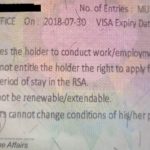Now, for as long as they’ve had their independence, African countries have also recognized that the right of nations to chart their own path is bound up in ensuring the right of individual citizens to do the same thing.
So this brings me to our second priority: working with African partners to fulfill the promise of democracy.
The overwhelming majority of people across Africa prefer democracy to any other form of government. Even greater majorities oppose the authoritarian alternatives to democracy. More than 70 percent reject military rule; more than 80 percent reject one-man rule, according to the Africa-based polling organization Afrobarometer.
African citizens want democracy – that is clear. The question is whether African governments can make democracy deliver by improving the lives of their citizens in tangible ways. That is a challenge that is not unique to Africa. It’s one facing democracies in every part of the world, including the United States. And it’s a problem that won’t be fixed by maintaining the same approach.
So here’s what we’ll do differently. We won’t treat democracy as an area where Africa has problems and the United States has solutions. We recognize that our democracies face common challenges, which we need to tackle together, as equals, alongside other governments, civil society, and citizens.
That was the spirit that animated the 100 countries that came together for the Summit for Democracy President Biden hosted last December. It will drive the African Leaders Summit that the United States will host this December for the first time since 2014 – providing an opportunity to build greater momentum around tackling shared priorities.
We will work with partners to tackle 21st century threats to democracy like misinformation, digital surveillance, weaponized corruption. We’ll launch a novel approach to good governance, the Global Fragility Act, which will make a decade-long investment in promoting more peaceful, more inclusive, more resilient societies in places where conditions are ripe for conflict, including Mozambique and the Coastal West African countries of Benin, Côte d’Ivoire, Ghana, Guinea, Togo.
In each of these places, we’re starting by asking our local partners where our help can make the biggest difference. And we’re drawing on decades of lessons learned in conflict prevention, such as cultivating relationships between community leaders, government officials, and security forces, which are vital to defusing tensions before they erupt into violence; and building resilience to the destabilizing impacts of climate change, like more frequent, more severe droughts.
Thanks to bipartisan support in the United States Congress, this initiative can count on $200 million a year in funding – every year, for 10 years. That’s the kind of horizon that will allow us to look beyond quick fixes.
We’ll focus on the connection between democracy and security. History shows that strong democracies tend to be more stable and less prone to conflict – and that poor governance, exclusion, and corruption inherent in weak democracies makes them more vulnerable to extremist movements as well as to foreign interference. That includes the Kremlin-backed Wagner Group, which exploits instability to pillage resources and commit abuses with impunity, as we’ve seen in Mali and the Central African Republic.
Continued next page
(150 VIEWS)

